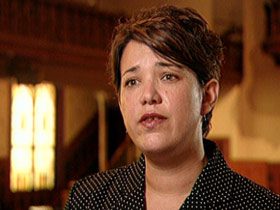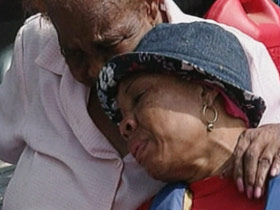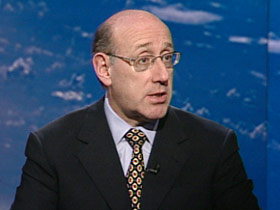In This Episode << SLIDE LEFT TO SEE ADDITIONAL SEGMENTS
Katrina Aftermath
BOB ABERNETHY, anchor: The fate of St. Charles Avenue Baptist Church in New Orleans is uncertain. Its pastor was evacuated to Baton Rouge while members of the church have spread across the nation. In the absence of a sanctuary where people can worship, Amy Butler, the church’s former associate pastor, is trying to minister to members online from her offices at the Calvary Baptist Church in Washington, D.C., where she is now pastor. She brings them prayer, solace and aid — all with the help of the Internet.

AMY BUTLER (Pastor, Calvary Baptist Church): Nobody knows what’s happened to the church. And the church building seems secondary, but it’s a symbol of this community that’s there to support us and be our family in times of crisis. And, so the first priority is to try to reconnect with all the people. And then we’ll start talking about the building.
We’ve been able to be a central clearing house for those who need news of each other — to regularly check in with a blog online where people are posting information about where friends and church family might be, passing out phone numbers, being available when people call to give information.
(talking on phone): There are still three who are missing. So, we’re looking for them.
I think the concept of the local church has taken on a broader perspective in this day and age where we have instantaneous connections with each other over the Internet and by the telephone. The building is not there and we’re not there together. But the people are together, and in an electronic way, able to pray with each other, support each other, listen to each other.
(reading from an e-mail): I can’t tell you how your words touched us. I’m really grateful for the support and prayer from you and the church.

I hear from people that they’re so grateful to be alive and to know that their families are alive. And, the thing that they want from me is somebody to listen, somebody to pray, somebody to cry with. That’s what I’ve been doing a lot.
(praying): Lord, we just ask for comfort in this time of grief and pain.
A voice of prayer to God that’s just a simple prayer for comfort and reassurance of God’s presence. And the spiritual component of this is to know that God is not going to abandon us. And, maybe that’s the best thing that I can do as a pastor right now — to say those prayers and to say those words over and over again. So, the little bit that I feel that I am contributing is being a long-distance pastor here to connect people and to just sort of re-establish this sense of community, even if it’s not in a place. We are the family of Christ and we will be there for each other during this time.
I don’t know how to answer the deeper theological questions related to this. I don’t think that God caused the hurricane. And I don’t think that God is pleased with the suffering and the pain of God’s people. I think and I know that God responds with love and compassion and asks us as the church, outside of this horrible event, to step up and to hold out a hand and help people remember where their strength is coming from.
ABERNETHY: Congress this week approved nearly 52 billion dollars for hurricane relief, bringing the total so far to more than 60 billion. And many predict it will go even higher. Meanwhile, this weekend’s anniversary of 9/11 four years ago brings to mind the extraordinary program Congress set up then for victims of the attacks. We talked about that victim’s compensation fund last week with the man who administered it, Kenneth Feinberg, who joins us again.
Welcome. In addition to everything that Congress has already done and is likely to do in the way of relief aid, do you think there should be again something like a victims’ compensation fund?

KENNETH FEINBERG (Author, WHAT IS LIFE WORTH?): Well, of course, that’s up to Congress. Congress, when they created the 9/11 fund, Congress acted very quickly as part of legislation to bail out the airline industry, to make sure that lawsuits would be diverted into a fund. So, the context, I think, was quite different.
ABERNETHY: Yeah, but people have suffered — lots of people have suffered through no fault of their own. So, is there then a reason to have some kind of victim’s compensation fund?
Mr. FEINBERG: I think from the perspective of the victim’s, it’s hard to distinguish Katrina from 9/11, from Oklahoma City, from the USS Cole, from the African embassy bombings. If you look at the problem of compensation from the victim’s perspective, I think especially in a free society like ours, it’s very difficult to make those distinctions. From the perspective of the nation, however, I’m dubious whether or not Congress will do in New Orleans, in the gulf, what it did in the 9/11 situation.
ABERNETHY: If it did decide to do something, you would recommend what, flat amounts for everybody?
Mr. FEINBERG: Yes, as I’ve said, if Congress decides, a big if, but if Congress decides, certainly I think, for a lot of reasons, a flat amount, the same amount for every eligible victim would be the way to go.
ABERNETHY: And, what’s the underlying philosophy here, is it that I’m responsible for my own life and if something bad happens, too bad?
Mr. FEINBERG: That’s part of it. I think, it’s the United States after all. Our heritage is limited government, the government is not a guarantor of life’s misfortunes. I think the 9/11 fund was an aberration. I don’t think you will find anywhere in American history, two million dollars on average, tax-free, to every eligible claimant. I think it really is an exception to the general rule.
ABERNETHY: Kenneth Feinberg. Many thanks.
Mr. FEINBERG: Thank you.

